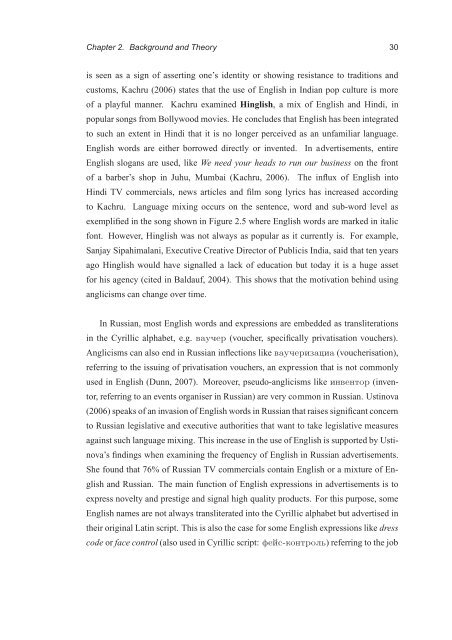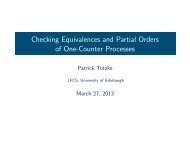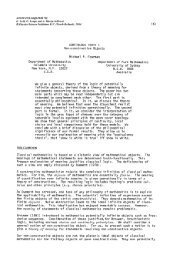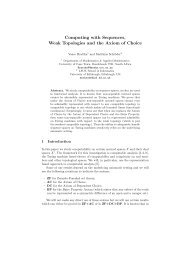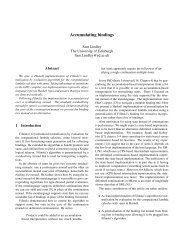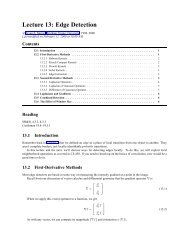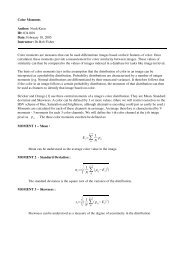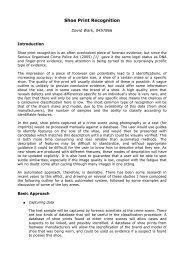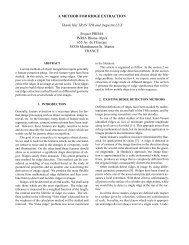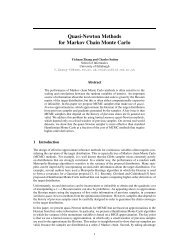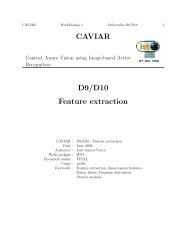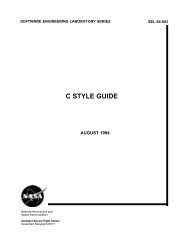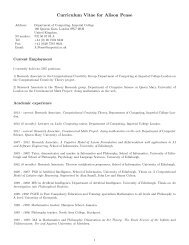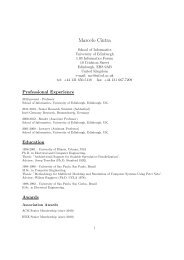PhD thesis - School of Informatics - University of Edinburgh
PhD thesis - School of Informatics - University of Edinburgh
PhD thesis - School of Informatics - University of Edinburgh
Create successful ePaper yourself
Turn your PDF publications into a flip-book with our unique Google optimized e-Paper software.
Chapter 2. Background and Theory 30<br />
is seen as a sign <strong>of</strong> asserting one’s identity or showing resistance to traditions and<br />
customs, Kachru (2006) states that the use <strong>of</strong> English in Indian pop culture is more<br />
<strong>of</strong> a playful manner. Kachru examined Hinglish, a mix <strong>of</strong> English and Hindi, in<br />
popular songs from Bollywood movies. He concludes that English has been integrated<br />
to such an extent in Hindi that it is no longer perceived as an unfamiliar language.<br />
English words are either borrowed directly or invented. In advertisements, entire<br />
English slogans are used, like We need your heads to run our business on the front<br />
<strong>of</strong> a barber’s shop in Juhu, Mumbai (Kachru, 2006). The influx <strong>of</strong> English into<br />
Hindi TV commercials, news articles and film song lyrics has increased according<br />
to Kachru. Language mixing occurs on the sentence, word and sub-word level as<br />
exemplified in the song shown in Figure 2.5 where English words are marked in italic<br />
font. However, Hinglish was not always as popular as it currently is. For example,<br />
Sanjay Sipahimalani, Executive Creative Director <strong>of</strong> Publicis India, said that ten years<br />
ago Hinglish would have signalled a lack <strong>of</strong> education but today it is a huge asset<br />
for his agency (cited in Baldauf, 2004). This shows that the motivation behind using<br />
anglicisms can change over time.<br />
In Russian, most English words and expressions are embedded as transliterations<br />
in the Cyrillic alphabet, e.g. vauqer (voucher, specifically privatisation vouchers).<br />
Anglicisms can also end in Russian inflections like vauqerizacia (voucherisation),<br />
referring to the issuing <strong>of</strong> privatisation vouchers, an expression that is not commonly<br />
used in English (Dunn, 2007). Moreover, pseudo-anglicisms like inventor (inven-<br />
tor, referring to an events organiser in Russian) are very common in Russian. Ustinova<br />
(2006) speaks <strong>of</strong> an invasion <strong>of</strong> English words in Russian that raises significant concern<br />
to Russian legislative and executive authorities that want to take legislative measures<br />
against such language mixing. This increase in the use <strong>of</strong> English is supported by Usti-<br />
nova’s findings when examining the frequency <strong>of</strong> English in Russian advertisements.<br />
She found that 76% <strong>of</strong> Russian TV commercials contain English or a mixture <strong>of</strong> En-<br />
glish and Russian. The main function <strong>of</strong> English expressions in advertisements is to<br />
express novelty and prestige and signal high quality products. For this purpose, some<br />
English names are not always transliterated into the Cyrillic alphabet but advertised in<br />
their original Latin script. This is also the case for some English expressions like dress<br />
code or face control (also used in Cyrillic script: feis-kontrolь) referring to the job


